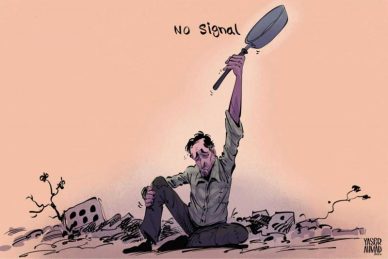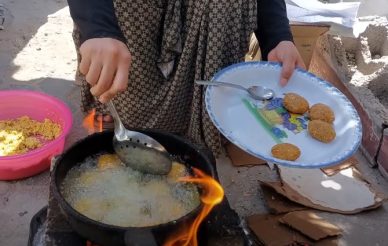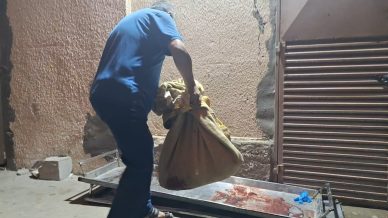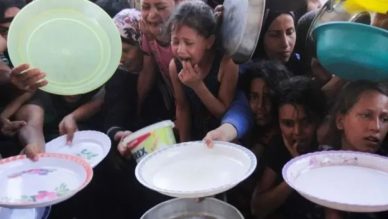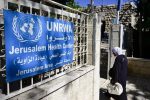GAZA, (PIC)
Since Israel began its war of extermination on the Gaza Strip, children have been the biggest victims, paying the price for this brutal aggression that has killed and destroyed any hope for a normal childhood like other children around the world.
Gaza’s children have become either martyrs, amputees, or orphans, or they stand in long lines, hungry and thirsty, waiting for a little amount of food.
The child Zain is one of those children left with an unhealable wound by the Israeli occupation. Zain lost his mother two months ago; she was martyred in the Israeli bombing of the Nuseirat refugee camp.
Journalist and activist Saleh Al-Jafarawi shared a video on his Instagram account showing Zain sleeping on his mother’s grave. He commented, “Child Zain Youssef Mahna’s mother was martyred two months ago during the bombing of the Nuseirat camp, and since then, he comes every day to sleep on her grave.”
Al-Jafarawi asked Zain, “Why are you sleeping on the grave?” The child replied, “I want to sleep in my mother’s arms.” When asked if he was afraid of the bombing and darkness, Zain responded, “I’m not afraid of anyone. I want to come to her every day. I miss her a lot.”
The video sparked sadness and shock among social media users, and one commenter noted, “The war will not end with a ceasefire. Inside every child who has lost his family, there is a war that continues forever. Loss is a deadly feeling, and we rely on Allah for support.”
One resident of Gaza shared his experience of losing his mother and other family members due to the Israeli killing machine, “At least he can go to his mother’s grave. As for me, they killed my mother, and my sister is buried with her, next to them are my father, my siblings, and my niece, all embracing each other. I cannot go to them, and I don’t even know if their graves are okay or not, because the occupation army does not only kill the living; it also demolishes and steals the bodies of the martyrs.”
The video gained over 13 million views in less than 24 hours since it was posted by Saleh Al-Jaafrawi on his Instagram account. Medical sources in Gaza report that the number of children who have been martyred due to the Israeli aggression on the Gaza Strip has reached 13,430, while the number of female martyrs is estimated at 8,900 since October 7, 2023.
Gaza: A graveyard for childhood
Earlier, the United Nations Children’s Fund (UNICEF) described the Gaza Strip as a “graveyard for children,” emphasizing that the people of Gaza live in a shattered existence, trapped in a cycle of indescribable pain and suffering amid the ongoing genocide that has persisted since October 7, 2023.
UNICEF Executive Director Catherine Russell noted that the past weekend was particularly bloody for children in northern Gaza, where more than 50 children were martyred in Jabalia alone within just 48 hours, especially as the occupying army targeted residential buildings housing hundreds of displaced people and residents.
It is worth mentioning that UNICEF has repeatedly stated since the beginning of the Israeli war on Gaza that the ongoing aggression is a “war on children.”
Communication specialist at UNICEF, Tays Ingram, said that children have become the negative reflection of this ongoing war, suffering devastating injuries from airstrikes, trauma from violent clashes, and loss. Their stories paint a horrific picture of the humanitarian consequences of the conflict.
She added, “The nature of this war is chaotic, often affecting civilians, including children, and costing tens of thousands of lives; its disproportionate impact on children is evident, as one in every two people in Gaza is a child.”
Before the outbreak of the genocide against Gaza, UNICEF estimated that over 500,000 children needed mental health and psychosocial support services in the Gaza Strip. Today, estimates indicate that nearly all children require these services, amounting to over a million children.
Severe psychological trauma
The United Nations Relief and Works Agency for Palestine Refugees (UNRWA) reports that more than 625,000 children in the Gaza Strip suffer from severe psychological trauma, with many considered “out of school and living among the ruins.”
The agency affirms that children in Gaza have suffered immense losses for almost a year since the onset of the Israeli aggression. It notes that even before the war began, most families in Gaza faced significant difficulties in providing food, adding that “after 12 months of war, we have seen an increase in cases of malnutrition, disease, deaths, and psychological trauma.”
Psychiatrist Jamal Farwaiz, who has worked as a psychiatric consultant for the UN in various conflict zones, believes that the genocide against Gaza will have severe psychological repercussions for all citizens of the Gaza Strip, nearly 2.5 million in total. However, the most affected groups will be children, who will face particularly harsh traumas.
Gaza’s children are subjected to successive psychological traumas due to recurring aggressive wars on the region. According to a report by the Norwegian Refugee Council in 2021, following the aggression in May known locally as the “Sword of Jerusalem” battle, 12 out of 60 children who were martyred were receiving psychological treatment from the council to help them cope with the traumas of previous wars.
Emotional absence
Psychologist Mais Nasar explained that children primarily rely on the support and care of the adults around them, which suddenly disappears during wars due to the loss of caregivers (primarily parents) or even due to the emotional absence of parents caused by the war environment filled with fear, tension, and a focus on survival and protection.
In an article about the psychological traumas caused by aggression, she noted that the absence of all these factors, in addition to war traumas such as direct physical injuries often accompanied by psychological injuries, and exposure to scenes of death and killing, leaves lasting psychological effects that accompany them throughout their lives. One of the most significant of these is post-traumatic stress disorder (PTSD), which is one of the most common disorders among children living in war-torn areas.
Additionally, children face anxiety and depression disorders, as well as psychological changes manifested in emotional withdrawal, temper tantrums, and aggressive behavior that somewhat mimics the violence or harm they experience.
According to the American Journal of Mental Health, 22% of people living in conflict-affected areas suffer from depression, anxiety, PTSD, and bipolar disorder. Research from the Royal College of Psychiatrists indicates that symptoms of psychological disorders after wars appear weeks or within three months, including physiological symptoms such as muscle pain, diarrhea, irregular heartbeat, headaches, and appetite disturbances. These physiological symptoms coincide with psychological symptoms such as panic attacks, fear, depression, anxiety, and feelings of guilt.


